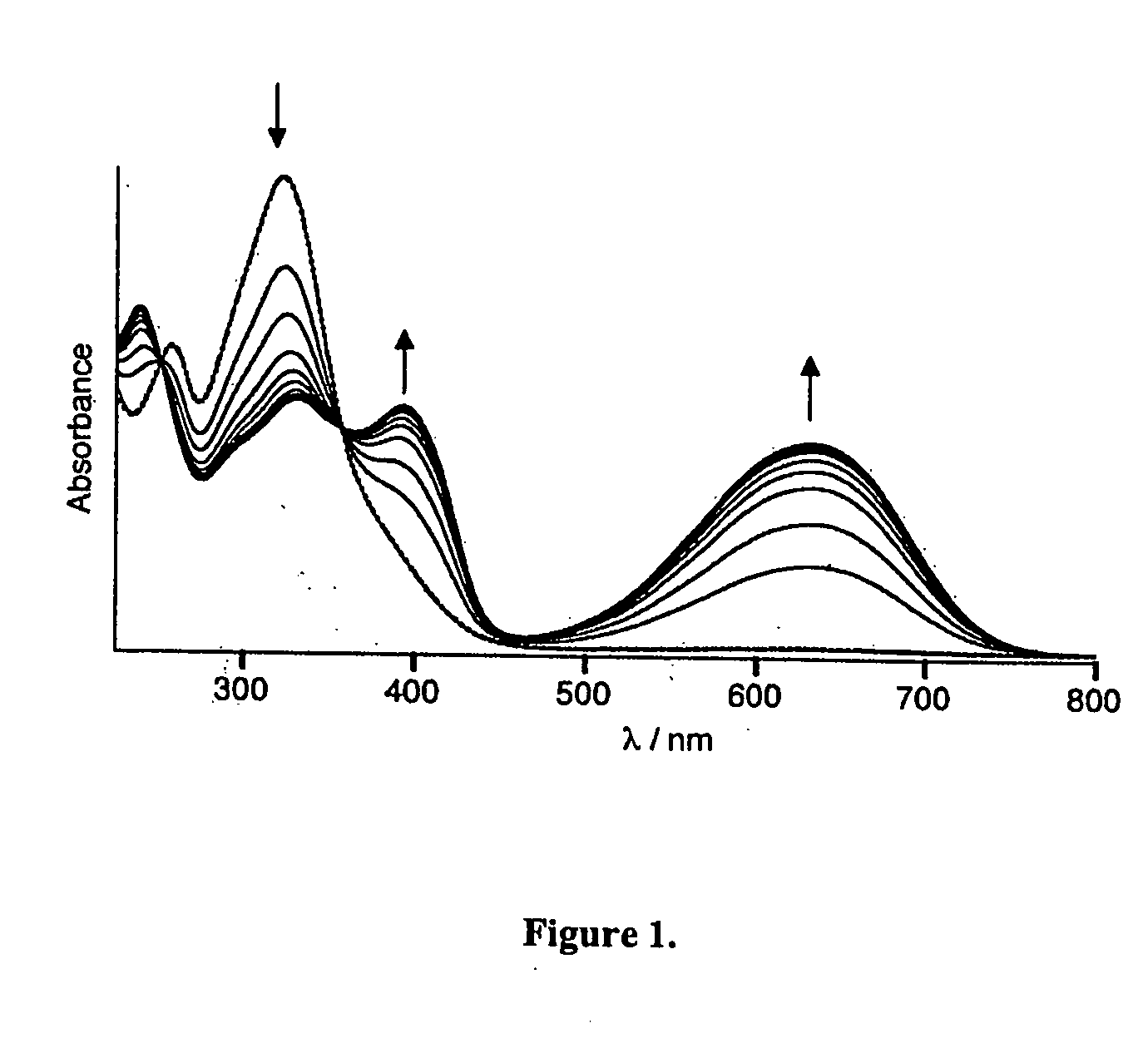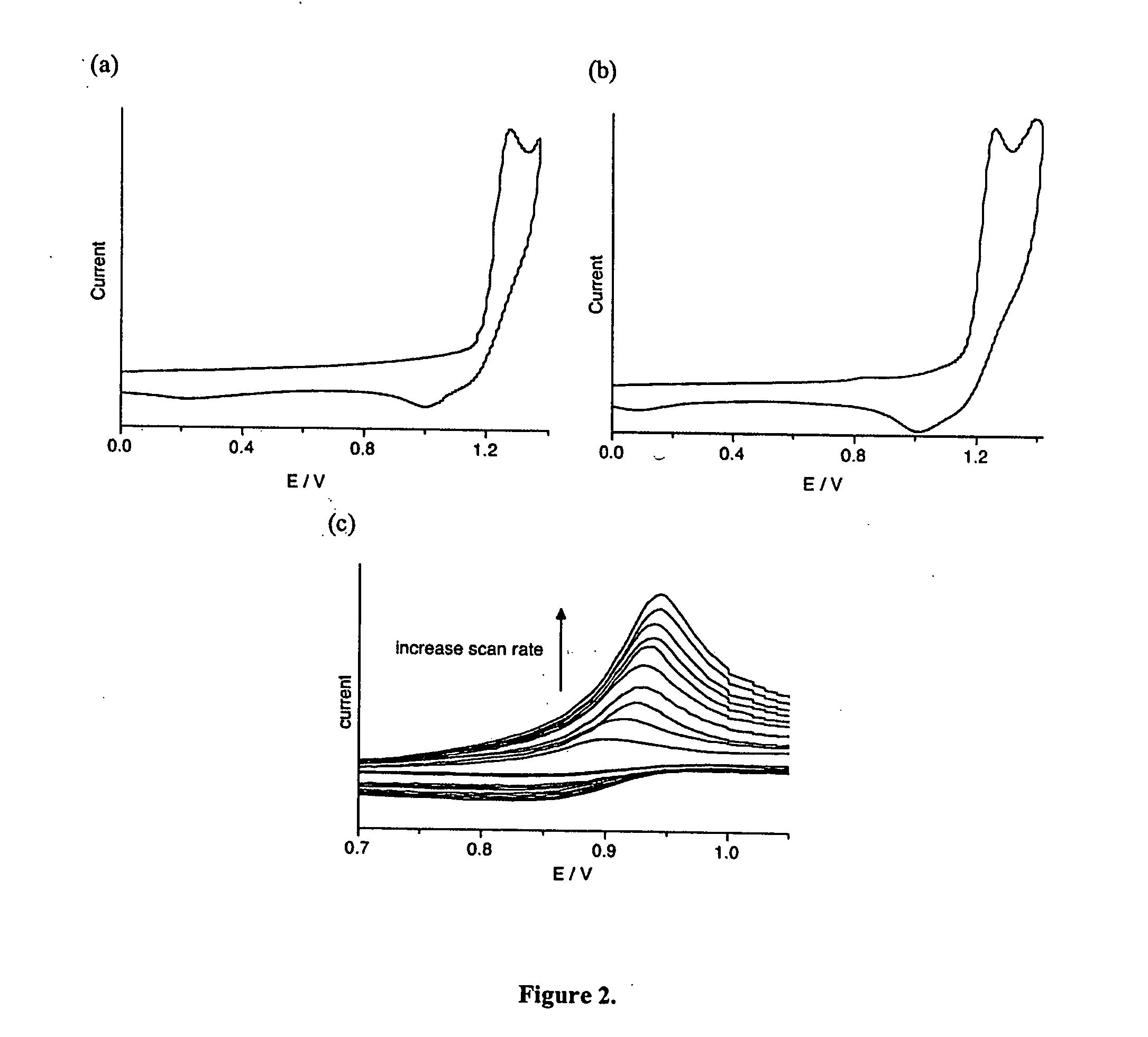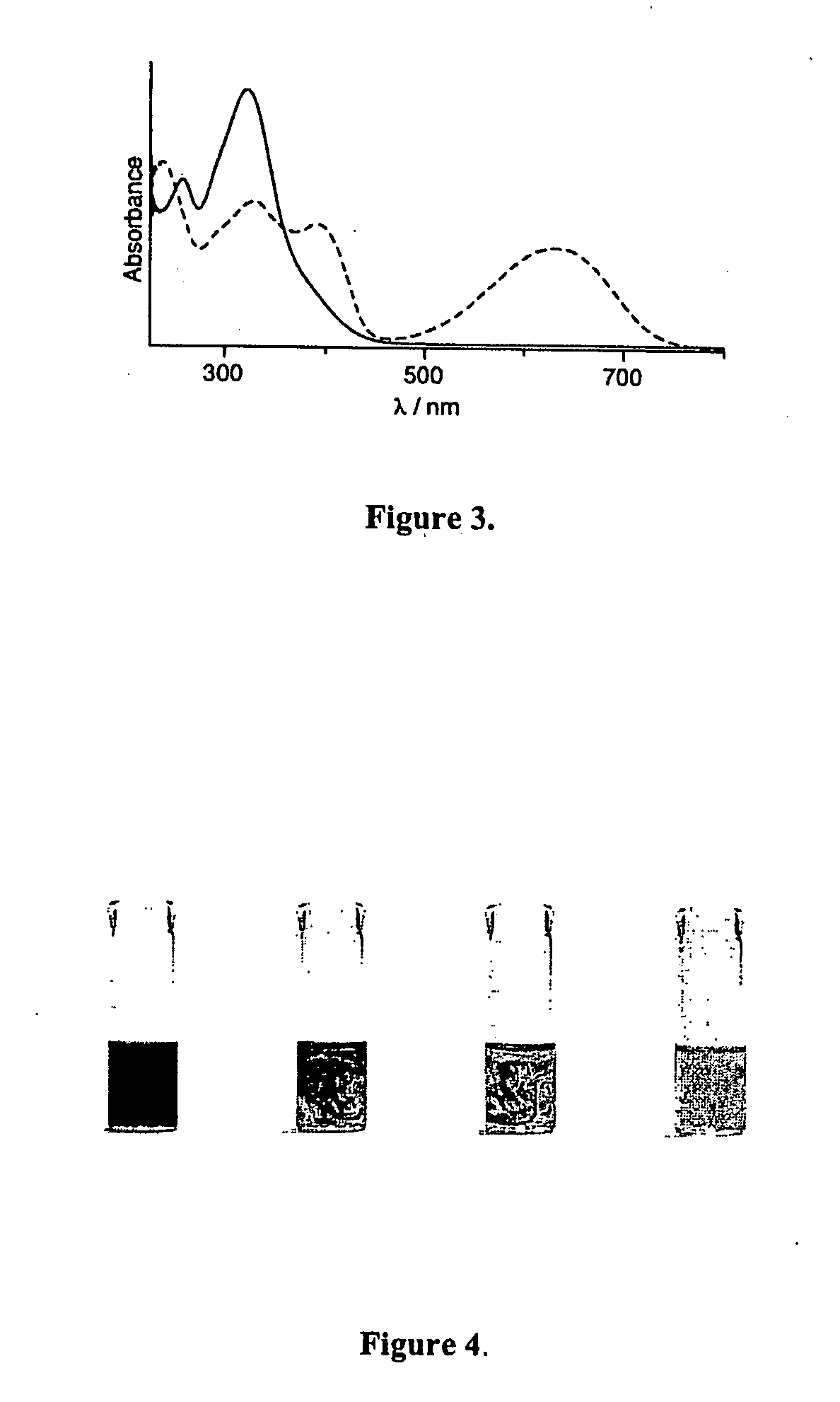Photochromic and electrochromic compounds and methods of synthesizing and using same
a technology applied in the field of photochromic and electrochromic compounds and methods of synthesizing and using same, can solve the problems of inability to independently address the interior layer using light alone, affecting the effect of the composition, and affecting the composition of the composite system, so as to achieve effective neutralization, maintain charge balance, and minimize the diffusion of counterions
- Summary
- Abstract
- Description
- Claims
- Application Information
AI Technical Summary
Benefits of technology
Problems solved by technology
Method used
Image
Examples
example 1
1.1 Synthesis of 1,2-bis(2,5-bis(2-thienyl)-3-thienyl)hexafluorocyclopent-1-ene (Compound 1)
[0042]
[0043] A solution of 3′-bromo-2,2′;5′2′terthiophene (0.749 g, 2.3 mmol) in anhydrous Et2O (25 mL) cooled to −20° C. was treated with n-BuLi (0.91 mL of a 2.5 M solution in hexane) dropwise under an argon atmosphere. After stirring the solution for 30 min, octafluorocyclopentene (0.13 mL, 1.15 mmol) was added dropwise using a cooled gas tight syringe and the solution immediately turned dark red in colour. After stirring for 1 h, the cooling bath was removed and the solution was allowed to warm to room temperature and stirred for 16 h when it was quenched with 5% HCl (10 mL). The aqueous layer was separated and extracted with Et2O (2×10 mL). All organic extracts were combined, washed with H2O (2×10 mL), followed by brine (10 mL), dried (Na2SO4) and filtered. The solvent was evaporated under reduced pressure and the crude product was purified using column chromatography through silica gel...
example 2
2.1 Synthesis of 1,2-bis(2,2′-bithien-3-yl)hexafluorocyclopent-1-ene (compound 2).
[0057]
[0058] A solution of 3-bromo-[2,2′]bithiophenyl (0.500 g, 2.3 mmol) in anhydrous Et2O (25 mL) cooled to −20° C. was treated with n-BuLi (0.82 mL of a 2.5 M solution in hexane) dropwise under an argon atmosphere. After stirring the solution for 30 min, octafluorocyclopentene (0.13 mL, 1.0 mmol) was added dropwise using a cooled gas tight syringe and the solution immediately turned dark red. After stirring at this temperature for 1 h, the cooling bath was removed and the reaction mixture was allowed to warm to room temperature and stirred for 16 h when it was quenched with 5% HCl (5 mL). The aqueous layer was separated and extracted with Et2O (2×10 mL). All organic extracts were combined, washed with H2O (2×10 mL), followed by brine (10 mL), dried (Na2SO4) and filtered. The solvent was evaporated under reduced pressure and the crude product was purified using column chromatography through silica g...
example 3
3.1 Synthesis of the 1,2-bis(2,5-diphenylthien-3-yl)-hexafluorocyclopent-1-ene (compound 3)
[0065]
3.1.1 Synthesis of 3-bromo-2,5-diphenylthiophene (BT1)
[0066] Phenylboronic acid (0.756 g, 6.2 mmol) was added to flask containing deoxygenated THF (10 mL) and a 20% w / w Na2CO3 solution (10 mL) under a nitrogen atmosphere and stirred vigorously. 2,3,5-tribromothiophene (1.022 g, 3.1 mmol) and Pd(PPh3)4 (0.107 g, 0.096 mmol) were added and the solution was heated at reflux under a nitrogen atmosphere for 24 h. The heat source was removed, the reaction mixture was allowed to cool to room temperature and extracted with CH2Cl2 (3×20 mL). The combined organic extracts were washed with H2O (2×20 mL) followed by brine (2×20 mL), dried (Na2SO4) and filtered. The solvent was evaporated under reduced pressure and the crude product was purified using column chromatography through silica gel (hexanes) yielding 0.553 g of pure product as a white solid. Yield: 57%.
[0067] M.p. 43-44° C.; 1H NMR (400 ...
PUM
| Property | Measurement | Unit |
|---|---|---|
| temperature | aaaaa | aaaaa |
| wavelengths | aaaaa | aaaaa |
| temperature | aaaaa | aaaaa |
Abstract
Description
Claims
Application Information
 Login to View More
Login to View More - R&D
- Intellectual Property
- Life Sciences
- Materials
- Tech Scout
- Unparalleled Data Quality
- Higher Quality Content
- 60% Fewer Hallucinations
Browse by: Latest US Patents, China's latest patents, Technical Efficacy Thesaurus, Application Domain, Technology Topic, Popular Technical Reports.
© 2025 PatSnap. All rights reserved.Legal|Privacy policy|Modern Slavery Act Transparency Statement|Sitemap|About US| Contact US: help@patsnap.com



